| |
STORIES, BOOKS & MEDIA

The majority of the following books are from the library of Chon Tri. Many of the summaries and in his own words. If you wish to purchase the book, click on the cover image and you will be linked to Amazon.com.
| Select a Category » |
[
Foundation
]
[
Practice
]
[
Sutra & Sastra
]
[
Koans
]
[
Works
]
[
History & References
]
[
Essays & Studies
]
[
Others
]
» Buy this book
» Recommend a Book
|
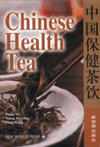
|
11. CHADO: CHINESE HEALTH TEA
by Dang Yi
Publisher: New World Press (ISBN #: 780005554X, Paperback: 346 pages, January 2001)
» Submit a review
Summary
Editorial Reviews
Lu Yu of the Tang Dynasty
I would rather drink no wine for my entire life than drink no tea every day.
Book Description
Everyone knows about tea but most people know little about health tea. Recent studies on tea have proved that tea can remove greasiness, refresh the mind, lower blood pressure, activate qi and blood, kill bacteria, treat inflammation, protect viscera, alleviate exposure to radioactivity, replenish vitamins, protect teeth, prevent diarrhea and cancer, and eliminate foul breath. Basically there are four types of health tea: tea for health care, tea for prevention, tea for treatment and tea for rehabilitation. This book introduces more than 700 kinds of health tea for treatment or prevention of diseases.
|
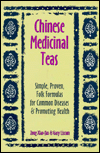
|
12. CHADO: CHINESE MEDICINAL TEAS: SIMPLE, PROVEN, FOLK FORMULAS FOR COMMON DISEASES AND PROMOTING HEALTH
by Gary Liscum, Xiao-Fan Zong, Bob Flaws (editor)
Publisher: Blue Poppy Press; 1st ed edition (ISBN #: 0936185767, Paperback: 190 pages , June 1996)
» Submit a review
Summary
Editorial Reviews
Bastyr University, The Library Letter, Fall 1997
"Chinese Medicinal Teas describes a variety of herbal teas for treating various conditions. This book is designed for anyone with a knowledge of TCM patterns analysis. For lay readers the authors suggest to match up not only the disease indications, such as headache or vomiting, but also the other symptoms which go along with the TCM pattern for which each tea is suggested. The reader, after finding which tea fits his/her symptoms, simply follows the directions for making the herbal tea. The authors list the ingredients to use and give directions on how the tea should be made and administered. After each recipe, the authors indicate the function of the tea with relation to the organ [it treats].
For readers interested in buying the ingredients there are addresses of herbal companies in the last section of the book. There is also a small discussion on how to tell whether the tea is working well or not."
Book Description
Medicinal teas are a great complement to acupuncture and a simple, effective introduction to Chinese herbal medicine. The teas in this book are simple, containing only one, two, or three ingredients. While multi-ingredient decoctions are infamous for their bitter taste, these teas are mostly mild, pleasantly or neutrally flavored, and are quick and easy to prepare. Most contain either green or black tea, white or brown sugar, and one or two Chinese medicinal herbs. The ingredients are steeped in boiling water and then drunk as a healing beverage throughout the day.
|
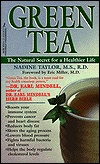
|
13. CHADO: GREEN TEA
by Nadine Taylor
Publisher: Kensington Publishing Corporation (ISBN #: 1575662434, Mass Market Paperback: 179 pages , January 1998)
» Submit a review
Summary
FROM THE PUBLISHER
In this completely accessible and understandable guide, readers learn how green tea acts as a stronger antioxidant than vitamin C or E and inhibits blood clots as effectively as aspirin. They discover how its wonderful health-giving properties guard against cancer, protect against heart disease, slow the aging process, and even help reduce weight, safely and effectively.
Complete, educational and even suprisingly enjoyable, September 8, 2000
Reviewer: Spiff (Europe)
I wasn't impressed when I saw it. This is a little book, 179 pages of cheap paper, and no photos, just text. Much to my surprise, it turned out to be quite a surprisingly competent book, Tea as an interesting subject? Now that I didn't expect.
This book will dedicate most of its pages to establishing the position of Green Tea as a healthy drink, mentioning all the aspects of how it can help your body (and mind, some say). It describes its history and some curious events, how to identify different kinds of green tea, where to buy it (Useful mostly to US readers). It will go as far as describing in detail the Japanese and Chinese tea ceremonies and giving you ideas for recipes. You also get a decent Glossary.
|

|
14. CHADO: GREEN TEA FOR HEALTH AND VITALITY
by Jorg Zittlau
Publisher: Sterling Publishing (ISBN #: 0806959096, Paperback, 96 pages, April 1999)
» Submit a review
Summary
FROM THE PUBLISHER
Discover green tea's simple but proven ability to heal the body, relax the mind, and renew the spirit. Drawing on both the latest in medical science and the best of ancient wisdom, you'll find green tea recipes that help you:
* use tea's healing effects on your heart, circulation, immune system, breathing, and common colds, as well as psychological and sexual lift.
* make tea part of a weight loss plan.
* try recipes for teas that blend healthy herbs, spices, juices.
* reduce wrinkles on your face and hands.
* slow aging.
* give energy to children.
* try different teas at different times of day and seasons of the year.
* Best of all: an A-to-Z list of ailments that tea can cure, from appetite disorders and arteriosclerosis to chronic tiredness and mouth sores, and from gastritis and sunburn to coughs and sore throat.
|
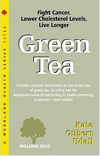
|
15. CHADO: GREEN TEA: FIGHT CANCER, LOWER CHOLESTEROL AND LIVE LONGER
by Kate G. Udall
Publisher: Woodland Publishing (ISBN #: 1580540244, Paperback: 23 pages , April 1998)
» Submit a review
Summary
This is less a book than an informative pamphlet, February 19, 2001
Reviewer: Joanna Daneman (Middletown, DE USA)
Look at the price and number of pages; this is a VERY slim volume on the health properties of green tea. If you want to have a reference book for yourself or for clients(perhaps you are a holistic health provider) then this book is excellent.
For recipes, more in-depth information, however, this book is just too condensed. In short, the basics, a good reference, the facts, just the facts, ma'am.
|
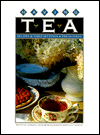
|
16. CHADO: HAVING TEA: RECIPES & TABLE SETTINGS
by Tricia Foley, Catherine Calvert, Keith S. Morton
Publisher: Clarkson Potter (ISBN #: 0517560070, Hardcover: 96 pages , December 1987)
» Submit a review
Summary
ANNOTATION
A celebration of the tea ceremony in our culture.
FROM THE PUBLISHER
What could be cozier on a blustery winter's day than a mug of tea by the fire with freshly baked Irish soda bread slathered with sweet butter and tangy orange marmalade? Or more invigorating on a crisp, cool afternoon in autumn than a picnic in the country with sharp English cheeses; crusty white peasant bread; vegetable, cheese, and apple tarts; and Thermoses of steaming warm tea? Or a better way to celebrate the ripe berries of summer than a dessert party tea in the garden with lemon-curd tartlets, raspberry shortcake, raspberry sorbet, sugar cookies, and tea served in flowered china cups?
A cookbook and style book, Having Tea includes a range of stunning locations with recipes, menus, table settings, and serving ideas for tea. There are formal and elegant teas that ring in the winter holidays with rich dark fruitcake, shortbread, brandy snaps, and sherried English trifle; a tea for one in the study with spicy ginger Bundt cake and a plate of cookies; and tea for two in a loft, with slow-scrambled eggs, cornmeal muffins and apple butter, and panfried tomatoes sprinkled with fresh tarragon. Each menu provides suggestions for the ideal tea to suit the meal.
Since the American style of tea drinking originated in England, Having Tea goes to the source to show two classic English tea rooms, tea at the Savoy Hotel in London, and a tea dance at London's Waldorf. In addition, there are special sections on the history and different varieties of teas, selections of teapots and tea services, and directions for brewing the perfect pot of tea. A final section, the "Tea Larder," offers ideas for tea trimmings from honey to mint or ginger, tea sandwiches, and a directory of mail-ordersources for tea.
With approximately fifty recipes for tea sandwiches, crumpets, scones, cookies, and cakes as well as hearty tea-time meals, Having Tea will make you want to make having tea part of your day. It shows how, far more than a beverage, tea is a grand indulgence that provides food for the body and the soul.
|
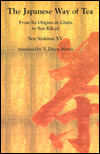
|
17. CHADO: JAPANESE WAY OF TEA: FROM ITS ORIGINS IN CHINA TO SEN RIKYU
by Sen Soshitsu, V. Dixon Morris (translator)
Publisher: University of Hawaii Press (ISBN #: 082481990X, Paperback: 264 pages, January 1998)
» Submit a review
Summary
FROM THE PUBLISHER
The author follows tea drinking practices from their arrival in Japan to the time of Rikyu, considering at each stage the relevant historical changes and their significance for the Way of Tea. Shortly after its arrival during the Heian era (794-1185), tea was celebrated by Japanese poets, who attributed the same spiritual qualities to the beverage as had their Chinese contemporaries. During the medieval era, however, tea began to take on a distinctively Japanese character. Eisai (1141-1215), the founder of the Rinzai sect of Japanese Zen Buddhism, accentuated the medicinal aspect of tea and saw it as a means of salvation in a spiritually degenerate age (mappo).
Melissa Cole, a tea student in San Francisco, March 29, 2001,
Tea Through The Ages
The Japanese Way of Tea is a wonderfully written book by the current Urasenke Grand Master. This books shows us the beginnings of tea in China and the development of the tea ceremony until the time of Sen Rikyu in the sixteenth century. It is a fascinating look at how much chanoyu has changed over the ages, from its humble beginnings, through elaborate tea parties, and then to its present style. This book is a comprehensive historical look at tea ceremony.
|

|
18. CHADO: LONGEVITY TEASET
by Product by Oriental Furniture
Publisher: Oriiental Furinture (ISBN #: B00075XM62, Set of 01 Tea Pot & 04 Cups, July 2004)
» Submit a review
Summary
Features:
* Approx. 5" Tall Teapot- 2 1/2" Diameter Teacups
* Longevity Caligraphy Symbol Decoration on Teapot and Cups
* Chinese High Temperature Porcelain Teapot w/ 4 Cups
|
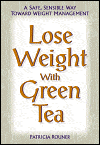
|
19. CHADO: LOSE WEIGHT WITH GREEN TEA: A SAFE, SENSIBLE WAY TOWARD WEIGHT MANAGEMENT
by Patricia Rouner
Publisher: Smith House Press (ISBN #: 0961522178, Paperback: 160 pages , October 2005)
» Submit a review
Summary
Editorial Reviews
Book Description
Documented research reveals what Asian cultures have known for centuries: Green Tea, rich in antioxidants, increases metabolism and helps burn fat. Lose Weight With Green Tea provides all the information you need to incorporate Green Tea safely and sensibly into a successful weight control program.
|
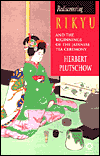
|
20. CHADO: REDISCOVERING RIKYU AND THE BEGINNINGS OF THE JAPANESE TEA CEREMONY
by Herbert Plutschow
Publisher: Global Oriental (ISBN #: 1901903354, Hardcover: 226 pages , February 2003)
» Submit a review
Summary
FROM THE PUBLISHER
Rediscovering Rikyu presents the first comprehensive, book-length study of the celebrated Japanese tea master Rikyu (1522-91), considered the father of the Japanese Tea Ceremony (cha-no-yu). For the first time, Rikyu's tea is considered as a profoundly important political as well as a socio-religious ritual in response to the dramatic changes taking place in the country at large: the hundred-year civil war -- Sengoku or Warring States period -- was finally coming to an end and the process of political unification under the strong military leadership of Oda Nobunaga (1534-82) and Toyotomi Hideyoshi (1537-98) had begun. A key focus of the book is the author's research into why Rikyu's tragic suicide was a necessary outcome of the emerging conflict between ritual, art and politics. The study also provides remarkable insights into a sixteenth-century Japanese sense of beauty commonly called wabi -- a simple, often austere beauty displayed in tea to unite host and guests as equals. In addition, Rediscovering Rikyu provides new and interesting insight into what links Rikyu's wabi tea with Zen Buddhism and ultimately to ritual and the state.
|
|
|

SUPPORT ZENGUIDE.COM

Purchase posters, art prints, media (music CD & DVD)
 STATUE OF BUDDHA
STATUE OF BUDDHA
by Ian Cumming
→Puchase this Item
→More Art Prints & Media
→Zen & Buddhism books
|
|
|
s
.
t
.
o
.
r
.
i
.
e
.
s
.
,
.
.
b
.
o
.
o
.
k
.
s
.
.
&
.
.
m
.
e
.
d
.
i
.
a
.
|















 STATUE OF BUDDHA
STATUE OF BUDDHA









